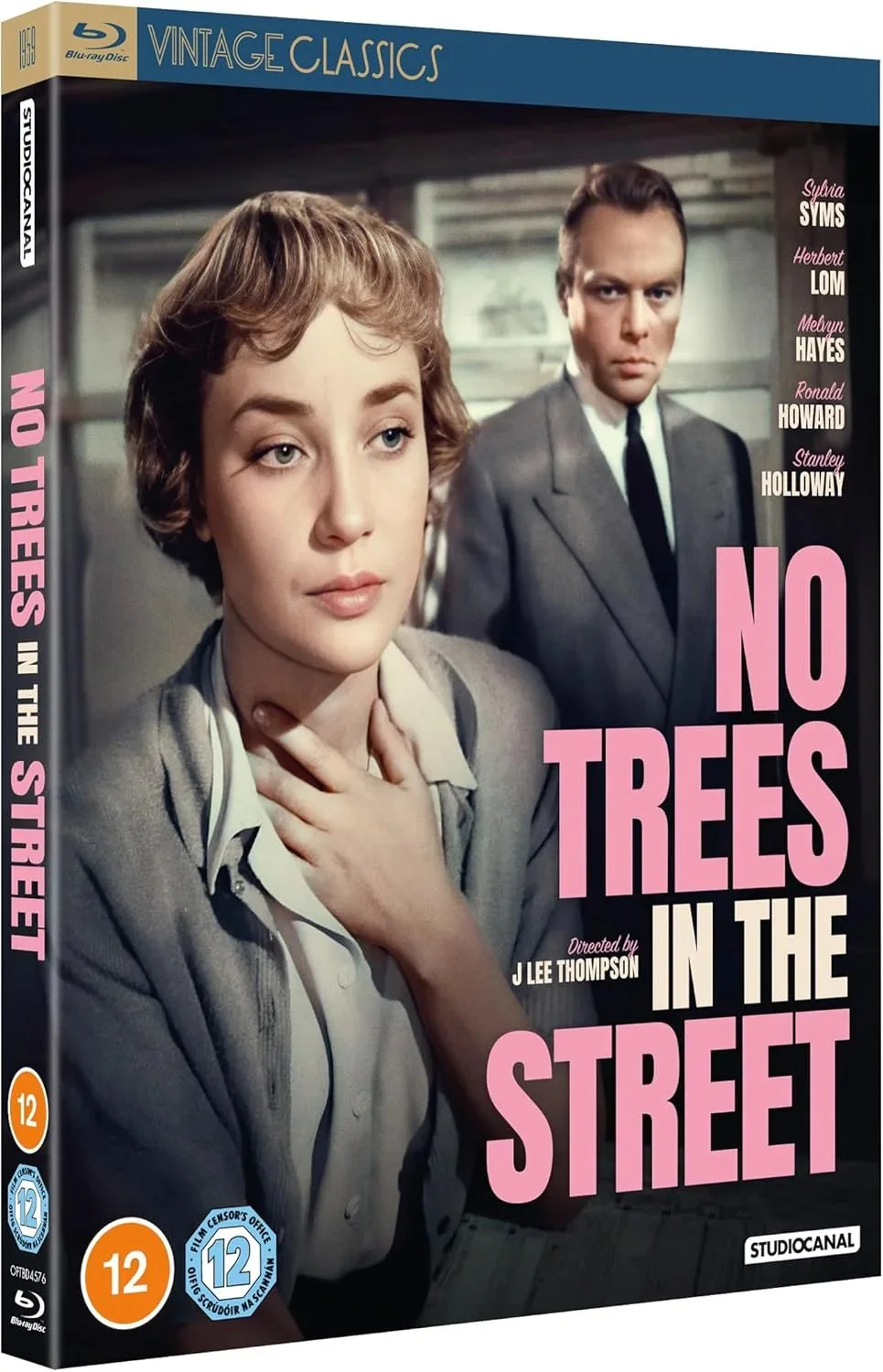No Trees in the Street │ StudioCanal
by JAMES CAMERON-WILSON
Social commentary doesn’t come much stronger than in J. Lee Thompson’s 1959 drama. Here, a jittery aerial shot swoops down on the meandering Thames and the industrial, terraced sophistication of London in the 1950s. The drama, an adaptation of the play by Ted Willis, opens with a shot of an open stretch of urban wasteland, where a young thug – played by David Hemmings – runs straight into the arms of a plainclothes policeman, played by Ronald Howard (son of Leslie Howard). Allowing for the poetic licence that the teenager would have seen the cop a mile off, it is a good starting point, as the detective inspector gives a Pythonesque/Harold McMillan sermon: “you’ve never had it so good, when I was twenty years younger…” And so we cut to the bustling life of the block – or rather, the street – as it used to be, before, presumably, the whole place was bombed during the Second World War. Besides the framing narrative at the start and the end, we never exit the street, enhancing the claustrophobia at the heart of the play’s drama. Hetty, played by Sylvia Syms at her most alluring, dreams – or fantasies – of one day escaping for a trip to Cornwall, while Herbert Lom’s bookie boasts of his trips “up West,” meaning his visits to the glamorous West End of London.
Hetty lives with her family in a cramped flat in a Victorian house with peeling paintwork and wallpaper in a street that is positively Dickensian, inhabited by street urchins, ball players, buskers, musicians, beggars, gossips, screaming babies and portable stalls selling fruit and live eels. So much life crammed into such a small area and we are never provided with the opportunity of escape. This is Poverty Row writ large, where the spirits are only revived with a round of bottles of brown Ale and a singalong with Stanley Holloway as a failed music hall performer who is always round for a gossip and a bit of cheer. They marvel at the salary of Ronald Howard’s Frank, reputedly six quid a week, while all that they appear to have to eat is bread and dripping.
No Trees in the Street is part of a double release of 4K restorations celebrating the work of director J. Lee Thompson and two British actresses who have recently left us: Sylvia Syms, who died in January of last year, and Glynis Johns, star of Thompson’s The Weak and the Wicked, who died this January, aged one hundred. Thompson, who directed Sylvia Syms in Ice Cold in Alex a year previously, in 1958, and went on to direct Tiger Bay, Guns of Navarone, Cape Fear – the Gregory Peck-Robert Mitchum version – and countless others, was very much of the old school and while the British New Wave of social realism was mushrooming all around him, he was still very much rooted in the studio mould. Here, he introduces elements of American film noir, deep focus and melodramatic acting, and as such No Trees in the Street serves as a fascinating time capsule.
Looking back from 1959, the film shows a new Britain, with its pristine high-rise housing blocks on the verge of the Swinging Sixties, with David Hemmings himself as a hooligan just seven years before his starring role in Antonioni’s era-defining pop-cultural phenomenon, Blow-Up. Back then, it seems, so much happened so fast. On the wall at the end of the street in late 1930s’ London is the graffiti-scrawled legend, ‘Mosley for Britain means war’ – but war came anyway and wiped out the entire neighbourhood. At the centre of the drama is Sylvia Syms, who is desperate to flee the suffocating poverty around her, but who seems beholden to the only neighbour who appears to have made good, Wilkie, played by an almost Brando-esque, heavy-lidded Hebert Lon, an immigrant who arrived with nothing but an accent, and who now has his own car. The other character in the drama is Hetty’s younger brother Tommy, played by Melvyn Hayes, for whom crimes appears to be the only escape route. On the extras on the Blu-Ray is an interview with Hayes, who is now a youthful 89 – as of last January – along with an eloquent appraisal by the historian Melanie Williams, and a cosy discussion on the film with Matthew Sweet and the film critic Phuong Le. If nothing else, the film makes one appreciate what we have today, when it’s no longer unusual to own one’s own car and eating chicken is not something we need to boast about. No Trees in the Street is out now, as is J. Lee Thompson’s The Weak and the Wicked, co-starring Diana Dors and John Gregson, both beautifully restored in all their pristine glory – courtesy of StudioCanal on their Vintage Classics Collection, available on Blu-ray, DVD and Digital.
STUDIOCANAL’s release of No Trees in the Street is now available on Blu-ray and in 4k
STUDIOCANAL is Europe’s leader in production, distribution and international sales of feature films and series, operating in all nine major European markets - France, United Kingdom, Germany, Poland, Spain, Denmark and Benelux - as well as in Australia and New Zealand. It owns the largest library in Europe and one of the most prestigious film libraries in the world, boasting more than 8,000 titles from 60 countries, which span 100 years of film history. 20 million euros has been invested into the restoration of 750 classic films over the past 5 years. Known for releasing a stunning roster of incomparable vintage classics titles, StudioCanal’s releases include outstanding thrillers, heart-rending masterworks, horror favourites, war dramas, Ealing comedies, and plenty of lesser-known gems. The collection boasts some of the greatest and beloved stars of British cinema.




